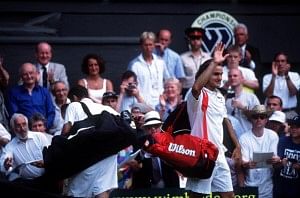
Wimbledon: The Theatre of Life

The pristine white and the perfect green. The appreciation that seldom rises beyond an enthusiastic applause. The Mr and Mrs that precede the names of often amused players. The courteous bow to the royal box in the presence of Her Majesty. There is a sense of sacredness that one comes to attach to Wimbledon. You cannot help but stand and admire the monument that, over the years, has refused to change, yet survived. It’s a long lived tradition that to this day, we are only too happy to leave alone. Undisturbed.
Every sport has its sacred land. Most of the time, it’s the abundance of history. Other times, a single event so significant, it changed the way the game was played and perceived. Wimbledon has stood so long, it can tell the tale of tennis by itself. Every single detail. The many a glorious chapter of the sports-rich past that have been played upon the lush green courts intimidate the spirit of even the most accomplished of champions, inspire a sense of reverence in even the most unruly of the sport’s fans. This is a venue where the greatest legends of the game have been crowned at their life’s pinnacle, also where those who were believed to be invincible were shown the transience of that elevated platform.
The Wimbledon has been much more than a mere sporting arena where the great and the ordinary alike have played their trivial games. It has been a theatre. Intense moments of unsullied happiness that can be experienced only on a land so historic. Punishing seconds of numbing grief when a lifetime of dreams shatters into nothingness at the feet of fickle fate. The spark of the prodigy. The fall of the legend. Every human emotion has been lived out on those courts to the unwavering eyes of the faithful audience. The Wimbledon has been the Theatre of Life.
Frustration. Anger at the inability to find solutions. One win in 3 years at the tournament. That was how the tale of a legend started. This was the story that was to turn into seven titles in eight years. A fairy tale.
Pete Sampras, after the painful start, made the Centre Court his very own in the nineties. It was Navratilova who said “Wimbledon is like a drug. Once you win it for the first time, you feel you’ve just got to do it again and again and again.” Nobody proved her right as much as Sampras did. It was whispered in hushed tones that he only need to appear and the silverware would walk with him. It was absolute glory, which created in those span of seven years, an illusion of the eternal. In a perfect world, you would imagine at the end of this glorious story, a teary eyed Sampras with the cherished Wimbledon trophy in his hands, bidding adieu to his tennis career. Happily ever after.
On the stage of Wimbledon it was not to be. A 19 year old Swiss, who was best known for the racquets that he broke on the court and not a slam to his name, ended a 31 match winning streak. After a fourth round exit, that was now unfamiliar, engulfed by the cheers that weren’t for him, the dethroned, followed the teenager out of what was believed to be his court. Many a tennis fan swears even today that it was the most painful picture ever painted on a tennis court, perhaps only next to what happened to Monica Sales. The following year, in his final appearance on the beloved grass, in the second round of the tournament, he lost to a 145 ranked fast-court specialist George Bastl, of who little was heard before, and little after. It ended where it began. Frustration. Anger. A drama that had it all.

The 19 year old Swiss himself has a story that is now legend. It was Boris Becker who first went on to call the Centre Court his ‘home’. He owned it for a long time. But when Sampras came along he said, “I had to hand over the keys. I was very reluctant. But I had to.” Sampras himself did not get to keep the keys forever. Just as he settled into the comforts of a retired life, the Swiss was at his door, demanding with the confidence that only 6 titles in seven years brings, for the keys. He could not be denied. He truly belonged at the SW19. The quiet whispers of invincibility which had turned to hurried murmurs were now being spoken out aloud. It was believed that the Spaniard on clay and the Swiss on grass could not be defeated. Not at least by mortals, that the players outside the two were assumed to be. Roger Federer was what you thought when you chanced by the word Wimbledon. They had become synonymous.
When a Frenchman, largely admired for the flamboyance that he brought to the tennis court but also widely believed to be incapable of challenging the big two, came back from two sets down in easily the best match of his career, to beat Roger Federer in the quarter finals of Wimbledon, disbelief was an emotion that you couldn’t miss. For someone, who in 178 Grand Slam matches had never lost the match after taking the first two sets, those emotions were perhaps new. He had soared high above the others most of his career. Suddenly he could feel hard rock underneath. Jo-Wilfred Tsonga had conquered territory that was known to be unbreachable. The mask of invincibility fallen aside, there was just a man behind. What was home now seemed hostile.
As Tsonga led the legend away from the sunshine of the centre court, one couldn’t help but wonder about the amazing drama that sport is. Every human emotion played out almost in slow motion. Life lived in a time-frame limited to the years of a sportsman’s career so that the birth, the death, the happiness, the grief, everything can be savoured at the expense of someone else. Perhaps there is an explanation to why men have followed sport for centuries. We get to be a part of an experience that is achieved only when a lifetime of goals are realised, or when years of hope shattered. We are not sure we want it in our own lives, but when the grief and happiness is someone else’s, we are happy to standby and experience those rare moments from the safe distance of the stands and our couches.
A seventeen year old teenage girl with no expectations being thrust the cherished trophy into her nervous hands. (Eight years on, she still waits for another occasion of glory to come her way.) A Serbian on whom sat the tag of ‘One Slam Wonder’ far too easily for way too long having a bite of the green central court grass, barely able to stand under the enormity of the moment. The sight of two exhausted men forcing a smile after a match that lasted 11 hours and 5 minutes and was played over 3 days with more than 200 aces. (Who won that epic really didn’t matter. We were just glad it was played.) Some of the most inspiring dramas that captured the best and worst of life, and Wimbledon was their theatre. A Theatre of Life. It was perhaps because of this reason that these words escaped Martina Navratilova (and its only fitting that I end with her words. Nobody has tasted victory on that beautiful grass as much as she has) “If I ever reached the stage where winning Wimbledon was no big deal, I’d know it was time for me to get out of the game.”